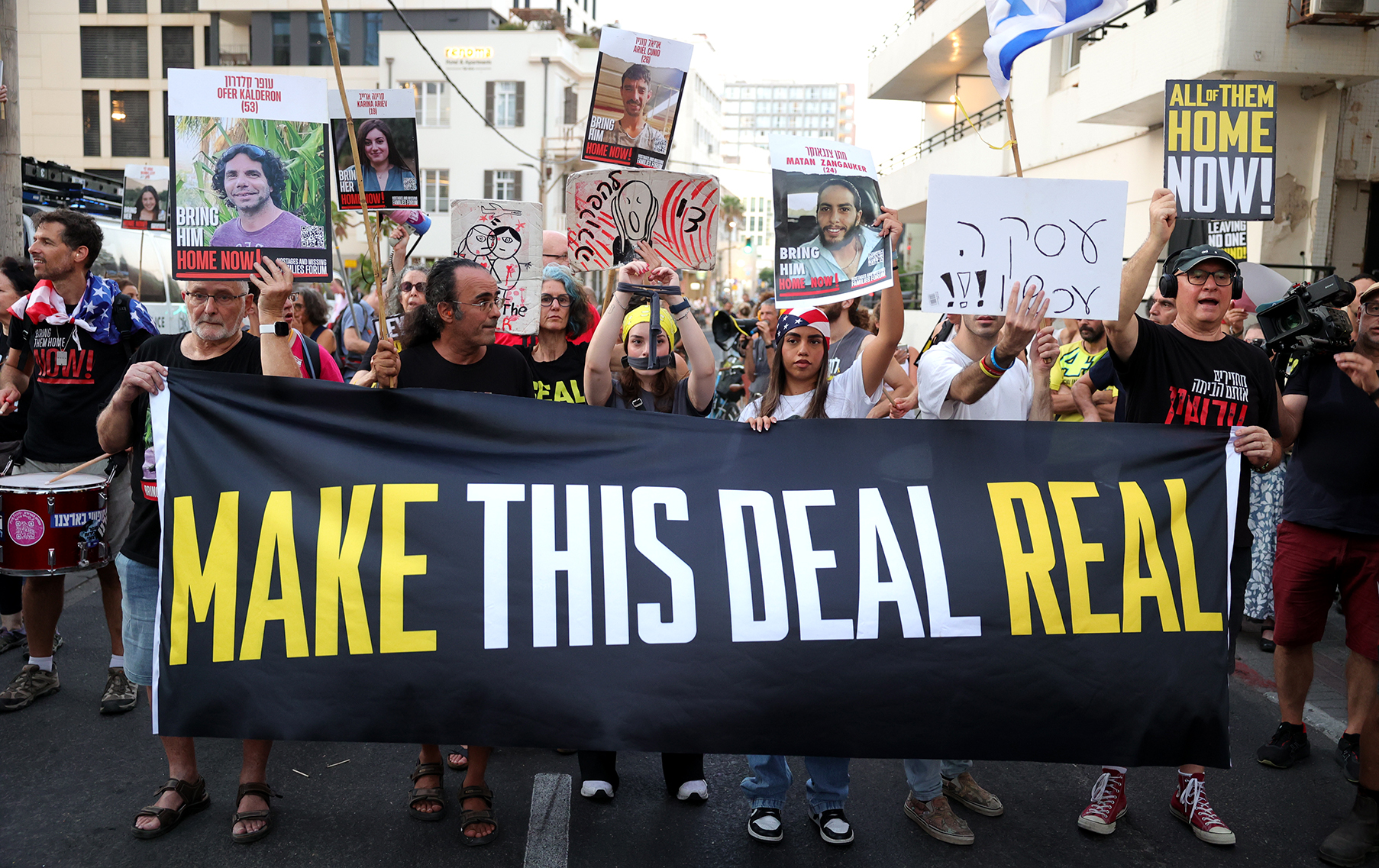Iran-backed Palestinian groups claimed responsibility for what they said was a “suicide mission” in Tel Aviv on Sunday, and warned of further such operations as long as Israel maintained its military campaign in Gaza.
Israel’s shekel slumped on Monday and the nation’s bond yields jumped to the highest since 1 August as an elusive ceasefire and a renewed threat of escalation kept investors on edge.
Blinken says Israel accepts ceasefire, Hamas must ‘say yes’
US Secretary of State Antony Blinken said Israeli Prime Minister Benjamin Netanyahu had accepted a ceasefire proposal to halt the war in Gaza and the next step was for “Hamas to say yes,” as the Biden administration looked to bring an end to the 10-month conflict at last.
Blinken, on his ninth trip to the region since Hamas attacked southern Israel on 7 October, called the proposed accord “a bridging agreement” and acknowledged that “not everything is spelt out in detail”. But it builds on a proposal that President Joe Biden put forward in late May which both sides had baulked at.
Blinken said the US “will never give up”, but that each passing day increased the risk of harm to hostages and raised the chance that the talks would be derailed. Iran and Hezbollah have vowed retribution for recent assassinations that they say were the work of Israel, and Blinken’s trip was seen in part as an effort to deter such a strike.
The top US diplomat said he would next travel on to Egypt and Qatar to understand what their leaders were hearing from Hamas on the next steps.
Blinken emphasised the need for an “enduring ceasefire,” a phrase that fell between Netanyahu’s past insistence on resuming the war until Hamas was destroyed and the demand of Hamas for a permanent end to the war and the withdrawal of Israeli troops from Gaza.
In a statement, Netanyahu described his meeting with Blinken as “good and important” and voiced appreciation for what he described as US recognition, amid the truce efforts, of vital Israeli security needs.
Underscoring his top priority in a deal, Netanyahu said the maximum number of living hostages held by Hamas should go free as part of a proposed first-phase ceasefire. Dozens of people holding up photos of the hostages spent hours demonstrating outside Blinken’s hotel in Tel Aviv, using signs and chants to urge him to pressure Netanyahu to accept a deal.
Earlier on Monday, Blinken met separately with Israeli President Isaac Herzog and Defense Minister Yoav Gallant, offering condolences for the loss of life in recent terrorist attacks against Israeli soldiers and civilians.
Gallant “emphasised the importance of ongoing military pressure placed by Israel on Hamas, alongside the need for ongoing US political pressure on Hamas, until a framework is achieved that will enable the return of hostages to Israel”, the defence ministry said in a statement following their meeting.
Iran-backed militant groups claim suicide operation in Tel Aviv
Iran-backed Palestinian groups claimed responsibility for what they said was a “suicide mission” in Tel Aviv on Sunday, and warned of further such operations as long as Israel maintained its military campaign in Gaza.
Hamas and Islamic Jihad, two Islamist organisations sponsored by Tehran, said in a joint statement on Telegram they were behind the bombing incident, which Israeli authorities said killed the detonator and injured one passer-by, with no further casualties.
“The brigades confirm that the suicide operations in the occupied territories will return to the forefront as long as the occupation continues with its massacres, displacement of civilians and its policy of assassination,” the statement read.
The Israeli police and Israeli Security Agency confirmed that the explosion, which went off shortly after 8pm in Tel Aviv, was an attempted suicide bombing “through the detonation of a powerful explosive device”.
Israeli shekel slides, volatility jumps on elusive ceasefire
Israel’s shekel slumped on Monday and the nation’s bond yields jumped to the highest since 1 August as the elusive ceasefire and a renewed threat of escalation kept investors on edge.
The currency fell by as much as 1.2% to 3.7139 per US dollar for the second-worst performance among about 150 currencies tracked by Bloomberg. The shekel’s one-month implied volatility, derived from options prices, rose to the highest since October 2023. The 10-year local bond yield increased for a second day, and the equity benchmark in Tel Aviv dropped the most in a week.
Ceasefire talks between Israel and Hamas stalled as both sides blamed each other for the delay and a blast in Tel Aviv underscored the risk of another spiral of violence. Israeli local markets, which had been somewhat resilient to war risks this year, showed signs of weakening under pressure after the latest economic data pointed to slower-than-expected growth.
“The core risk to the shekel surrounds the potential longevity of the conflict, which could create a structural break that may have reverberations for the currency’s long-run fair value,” said Ehsan Khoman, head of research for commodities, ESG and emerging markets at MUFG Bank in Dubai.
Oil slips as traders weigh demand signals and Middle East risks
Oil fell for the fourth time in five sessions as traders tracked geopolitical tensions in the Middle East alongside the outlook for the world’s two largest economies, the US and China.
West Texas Intermediate dropped by 0.6% to trade near $76 a barrel. Seasonally, crude prices tend to drift lower in August as summer demand slows. There have also been signs of softness in China, the biggest oil importer, as economic growth has slowed and the decarbonisation of the transportation sector has eroded some fuel demand.
Meanwhile, traders were awaiting a potential retaliatory attack by Iran on Israel. Ceasefire efforts were being hampered by fresh disagreements between Israel and Hamas, and Iran-backed Palestinian groups claimed responsibility for what they said was a “suicide mission” in Tel Aviv on Sunday. DM
Read more: Middle East crisis news hub





